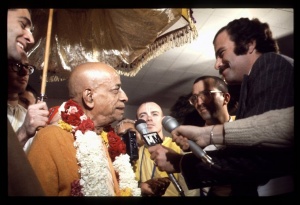SB 1.15.43: Difference between revisions
m (1 revision(s)) |
(Vanibot #0054 edit - transform synonyms into clickable links, which search similar occurrences) |
||
| (One intermediate revision by one other user not shown) | |||
| Line 1: | Line 1: | ||
{{info | {{info | ||
|speaker= | |speaker=Sūta Gosvāmī | ||
|listener=Sages of | |listener=Sages of Naimiṣāraṇya | ||
}} | }} | ||
[[Category:Srimad-Bhagavatam - Canto 01 Chapter 15]] | |||
[[Category:Bhagavatam Verses Spoken by Suta Gosvami - Vanisource|011543]] | |||
<div style="float:left">'''[[Srimad-Bhagavatam]] - [[SB 1|First Canto]] - [[SB 1.15: The Pandavas Retire Timely|Chapter 15: The Pāṇḍavas Retire Timely]]'''</div> | |||
<div style="float:right">[[File:Go-previous.png|link=SB 1.15.42]] '''[[SB 1.15.42]] - [[SB 1.15.44]]''' [[File:Go-next.png|link=SB 1.15.44]]</div> | |||
{{CompareVersions|SB|1.15.43|SB 1965|SB 1972-77}} | |||
{{RandomImage}} | |||
==== TEXT 43 ==== | ==== TEXT 43 ==== | ||
<div class="verse"> | |||
<div | :cīra-vāsā nirāhāro | ||
cīra-vāsā nirāhāro | :baddha-vāṅ mukta-mūrdhajaḥ | ||
baddha-vāṅ mukta-mūrdhajaḥ | :darśayann ātmano rūpaṁ | ||
darśayann ātmano rūpaṁ | :jaḍonmatta-piśācavat | ||
jaḍonmatta-piśācavat | :anavekṣamāṇo niragād | ||
anavekṣamāṇo niragād | :aśṛṇvan badhiro yathā | ||
aśṛṇvan badhiro yathā | |||
</div> | </div> | ||
| Line 20: | Line 25: | ||
==== SYNONYMS ==== | ==== SYNONYMS ==== | ||
<div class="synonyms"> | |||
<div | ''[//vanipedia.org/wiki/Special:VaniSearch?s=cīra&tab=syno_o&ds=1 cīra]-[//vanipedia.org/wiki/Special:VaniSearch?s=vāsāḥ&tab=syno_o&ds=1 vāsāḥ]'' — accepted torn clothing; ''[//vanipedia.org/wiki/Special:VaniSearch?s=nirāhāraḥ&tab=syno_o&ds=1 nirāhāraḥ]'' — gave up all solid foodstuff; ''[//vanipedia.org/wiki/Special:VaniSearch?s=baddha&tab=syno_o&ds=1 baddha]-[//vanipedia.org/wiki/Special:VaniSearch?s=vāk&tab=syno_o&ds=1 vāk]'' — stopped talking; ''[//vanipedia.org/wiki/Special:VaniSearch?s=mukta&tab=syno_o&ds=1 mukta]-[//vanipedia.org/wiki/Special:VaniSearch?s=mūrdhajaḥ&tab=syno_o&ds=1 mūrdhajaḥ]'' — untied his hair; ''[//vanipedia.org/wiki/Special:VaniSearch?s=darśayan&tab=syno_o&ds=1 darśayan]'' — began to show; ''[//vanipedia.org/wiki/Special:VaniSearch?s=ātmanaḥ&tab=syno_o&ds=1 ātmanaḥ]'' — of himself; ''[//vanipedia.org/wiki/Special:VaniSearch?s=rūpam&tab=syno_o&ds=1 rūpam]'' — bodily features; ''[//vanipedia.org/wiki/Special:VaniSearch?s=jaḍa&tab=syno_o&ds=1 jaḍa]'' — inert; ''[//vanipedia.org/wiki/Special:VaniSearch?s=unmatta&tab=syno_o&ds=1 unmatta]'' — mad; ''[//vanipedia.org/wiki/Special:VaniSearch?s=piśāca&tab=syno_o&ds=1 piśāca]-[//vanipedia.org/wiki/Special:VaniSearch?s=vat&tab=syno_o&ds=1 vat]'' — just like an urchin; ''[//vanipedia.org/wiki/Special:VaniSearch?s=anavekṣamāṇaḥ&tab=syno_o&ds=1 anavekṣamāṇaḥ]'' — without waiting for; ''[//vanipedia.org/wiki/Special:VaniSearch?s=niragāt&tab=syno_o&ds=1 niragāt]'' — was situated; ''[//vanipedia.org/wiki/Special:VaniSearch?s=aśṛṇvan&tab=syno_o&ds=1 aśṛṇvan]'' — without hearing; ''[//vanipedia.org/wiki/Special:VaniSearch?s=badhiraḥ&tab=syno_o&ds=1 badhiraḥ]'' — just like a deaf man; ''[//vanipedia.org/wiki/Special:VaniSearch?s=yathā&tab=syno_o&ds=1 yathā]'' — as if. | ||
cīra- | |||
</div> | </div> | ||
| Line 28: | Line 32: | ||
==== TRANSLATION ==== | ==== TRANSLATION ==== | ||
<div class="translation"> | |||
<div | |||
After that, Mahārāja Yudhiṣṭhira dressed himself in torn clothing, gave up eating all solid foods, voluntarily became dumb and let his hair hang loose. All this combined to make him look like an urchin or madman with no occupation. He did not depend on his brothers for anything. And, just like a deaf man, he heard nothing. | After that, Mahārāja Yudhiṣṭhira dressed himself in torn clothing, gave up eating all solid foods, voluntarily became dumb and let his hair hang loose. All this combined to make him look like an urchin or madman with no occupation. He did not depend on his brothers for anything. And, just like a deaf man, he heard nothing. | ||
</div> | </div> | ||
| Line 36: | Line 39: | ||
==== PURPORT ==== | ==== PURPORT ==== | ||
<div class="purport"> | |||
<div | |||
Thus being freed from all external affairs, he had nothing to do with imperial life or family prestige, and for all practical purposes he posed himself exactly like an inert mad urchin and did not speak of material affairs. He had no dependence on his brothers, who had all along been helping him. This stage of complete independence from everything is also called the purified stage of fearlessness. | Thus being freed from all external affairs, he had nothing to do with imperial life or family prestige, and for all practical purposes he posed himself exactly like an inert mad urchin and did not speak of material affairs. He had no dependence on his brothers, who had all along been helping him. This stage of complete independence from everything is also called the purified stage of fearlessness. | ||
</div> | </div> | ||
__NOTOC__ | |||
<div style="float:right; clear:both;">[[File:Go-previous.png|link=SB 1.15.42]] '''[[SB 1.15.42]] - [[SB 1.15.44]]''' [[File:Go-next.png|link=SB 1.15.44]]</div> | |||
__NOTOC__ | |||
__NOEDITSECTION__ | |||
Latest revision as of 18:01, 17 February 2024

A.C. Bhaktivedanta Swami Prabhupada
TEXT 43
- cīra-vāsā nirāhāro
- baddha-vāṅ mukta-mūrdhajaḥ
- darśayann ātmano rūpaṁ
- jaḍonmatta-piśācavat
- anavekṣamāṇo niragād
- aśṛṇvan badhiro yathā
SYNONYMS
cīra-vāsāḥ — accepted torn clothing; nirāhāraḥ — gave up all solid foodstuff; baddha-vāk — stopped talking; mukta-mūrdhajaḥ — untied his hair; darśayan — began to show; ātmanaḥ — of himself; rūpam — bodily features; jaḍa — inert; unmatta — mad; piśāca-vat — just like an urchin; anavekṣamāṇaḥ — without waiting for; niragāt — was situated; aśṛṇvan — without hearing; badhiraḥ — just like a deaf man; yathā — as if.
TRANSLATION
After that, Mahārāja Yudhiṣṭhira dressed himself in torn clothing, gave up eating all solid foods, voluntarily became dumb and let his hair hang loose. All this combined to make him look like an urchin or madman with no occupation. He did not depend on his brothers for anything. And, just like a deaf man, he heard nothing.
PURPORT
Thus being freed from all external affairs, he had nothing to do with imperial life or family prestige, and for all practical purposes he posed himself exactly like an inert mad urchin and did not speak of material affairs. He had no dependence on his brothers, who had all along been helping him. This stage of complete independence from everything is also called the purified stage of fearlessness.